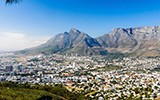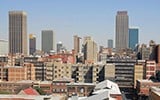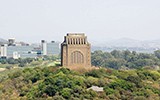Cosmopolitan, creative, festive and very friendly, Cape Town is a city where life is good and where one feels at home very ...
Living in South Africa guide for expats
All the information you need to relocate and live in South Africa.
Our selection of articles for expatriation in South Africa
Sport is a serious matter, and staying fit is one of the priorities of Cape Towners. The lifestyle revolves mainly around outdoor ...
The multicultural heritage of South Africa is reflected in its gastronomy. Cape Town, with its many restaurants and vineyards, is ...
Cape Town lies between Table Mountain and the Atlantic Ocean. It is a cosmopolitan, active and dynamic city with four million ...
Cape Town is one of the most popular cities for overseas property buyers and is one of the top 5 tourist destinations. It is ...
The legislative capital of South Africa and the Western Cape, Cape Town is the country's second-largest economy after ...
Cape Town is a university town. Three universities are located there: the University of Cape Town, the Stellenbosch University ...
Cape Town attracts expatriates as well as South Africans from other provinces who want to live, study or work in this city with ...
You are ready to take the plunge and come to work in Cape Town, but you are wondering about your integration in an unknown ...
South Africa is a huge country, unusual in the diversity of its landscapes, all of which are of remarkable beauty. If the choice ...
Anyone who is not a citizen or permanent resident of South Africa and wishes to work in South Africa must obtain a work permit ...
Pretoria, located about 50 km from Johannesburg, is the administrative capital and seat of the government of South Africa. The ...
Johannesburg, the provincial capital and largest city in Gauteng, the country's richest province, is South Africa's ...
A city of over three million people, Durban, also known as eThekwini, is one of the main tourist cities due to its tropical ...
Bringing a child into the world is, without a doubt, one of the most important and exciting decisions a couple can make. When ...
About South Africa
The South African population
The country has 3 capitals: Pretoria administrative capital, Cape Town legislative capital and Bloemfontein judicial capital. The population of approximately 60 million inhabitants lived from 1948 to 1994 under the Apartheid regime, the social and economic consequences of which are still felt today.
The Dutch (Boers or Afrikaans) arrived in South Africa in 1652 and founded the city of Cape Town but had to move north after the Cape of Good Hope was taken by the British in 1806.
From 1910 the English and Afrikaans governed together under the Union of South Africa, which became a republic in 1961 after a whites-only referendum.
In 1948, the National Party systematized the policy of Apartheid (separation in Afrikaans) practiced since the seventeenth century by the first Dutch colonists. The African National Congress (ANC), led by leaders such as Nelson Mandela, violently opposed this racist and segregationist regime, and in the late 1980s, the National Party agreed to negotiate a transition to majority rule. On June 30, 1991, apartheid laws were abolished, and in 1994, the first multiracial elections were held, which were won by the ANC. Nelson Mandela became the first black president of South Africa.
Since then, South Africa has been working to address the social inequalities of the apartheid era in housing, education and health care, but remains one of the most unequal countries in the world.
The black community represents 80% of the population but remains a heterogeneous group because it is divided into tribes, each with its own traditions and customs: Nguni, Sotho, Shangaun, Tsonga, Venda, Zulu and Xhosa. Their social and economic situation has not really improved because of the systemic inequalities that persist.
The white community, which represents 9% of the population, is 60% Afrikaans and 40% British. Afrikaans are conservative, mainly Calvinist, and very attached to their language and culture. Some of them are descendants of Huguenots (French Protestants who fled France after the revocation of the Edict of Nantes in the 18th century). The British community has remained very "British" in its lifestyle and traditions.
The Coloreds represent 9% of the population and are mostly present in Cape Town. They are mostly Muslim, and their mother tongue is Afrikaans. At the end of Apartheid, social and economic measures were mainly put in place for the black community, and the Coloreds were left out of the reforms. They live mainly in their own townships. The 2% of Indians and Asians are mainly small traders.
Languages in South Africa
There are eleven official languages in South Africa: Sepele, Sotho, Tswana, Venda, Tsonga, Swati, Afrikaans, English, Ndebele, Xhosa, and Zulu. The government recognizes only two official languages in the organizations under its jurisdiction: English and Afrikaans, a colonial injustice that continues.
The society in South Africa
Since 1994, South Africa has made efforts to address Apartheid-era social inequalities in housing, education and health care, but remains one of the most unequal countries in the world and is still fragmented by social and economic inequalities between black and white. Inequality persists, corruption plagues the country's highest institutions, and xenophobia is a constant threat.
Segregation is felt geographically, with the white minority concentrated in urban areas. The townships, separated from the privileged urban sectors, remain neighborhoods without social mix. Racial segregation still exists: nearly 50% of the population lives below the poverty line, and whites earn, on average, three to five times more than blacks. Despite the emergence of a black middle class, 20% of families live in extreme poverty. The same is true of healthcare in South Africa: 80% of the population uses the public healthcare system, which is underfunded and understaffed, while 20% of the population seeks care in the private sector, which is excellent.
Expats in South Africa
Expatriates who come to South Africa are shocked by the fact that people are referred to by their skin color, which implies economic, social and cultural stereotypes. The different communities live together, do not mix, but respect each other enough to live and work with each other, which is close to the "Rainbow Nation" project so dear to Desmond Tutu.
When you go abroad, you have to keep an open and positive mind (and especially stop comparing everything with your country of origin), don't hesitate to try new experiences, and get out of your comfort zone. Being interested in others and wanting to understand their culture and way of life is the best way to get closer to them and integrate.













